
By:
- Katherine Connor
Published Date
By:
- Katherine Connor
Share This:
Pioneering Bioengineer Shu Chien Teaches Lessons That Extend Far Beyond Research Lab
Renowned professor retires after 31 years at UC San Diego
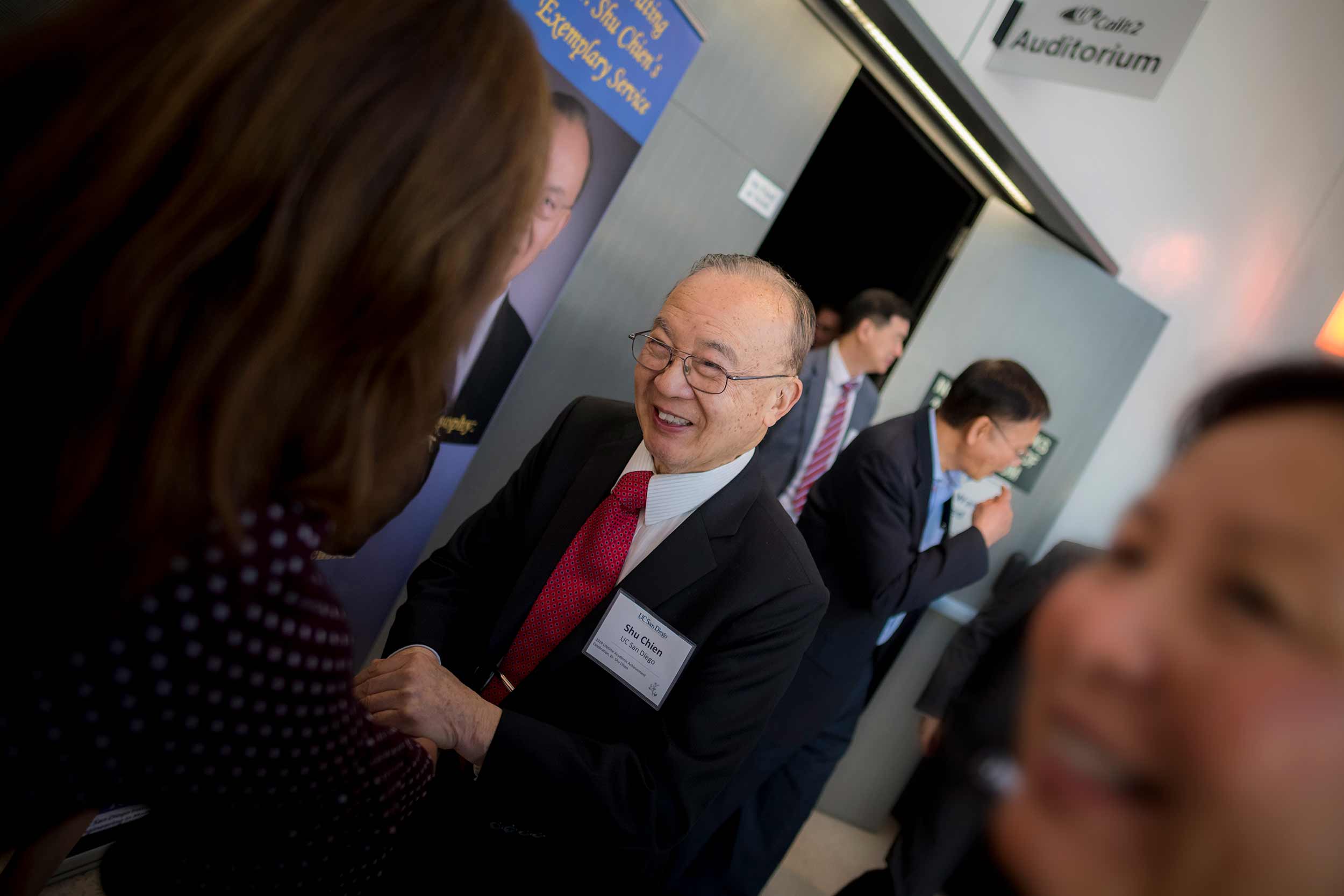
Shu Chien greets the more than 200 people who attended the celebration in honor of his retirement. Photos by Erik Jepsen/UC San Diego Publications
UC San Diego bioengineering professor Shu Chien made many foundational scientific discoveries over the course of his 62-year academic career, ranging from uncovering a key reason why sedentary lifestyles can be unhealthy to how to more efficiently screen for adverse effects of small molecule drugs in patients. But from the stories that emerged during a two-day celebration in honor of his retirement, it’s clear that it’s the lessons he unknowingly taught on how to be a better person that resonated most deeply with the hundreds of students, colleagues and collaborators around the world who view him as a beloved mentor.
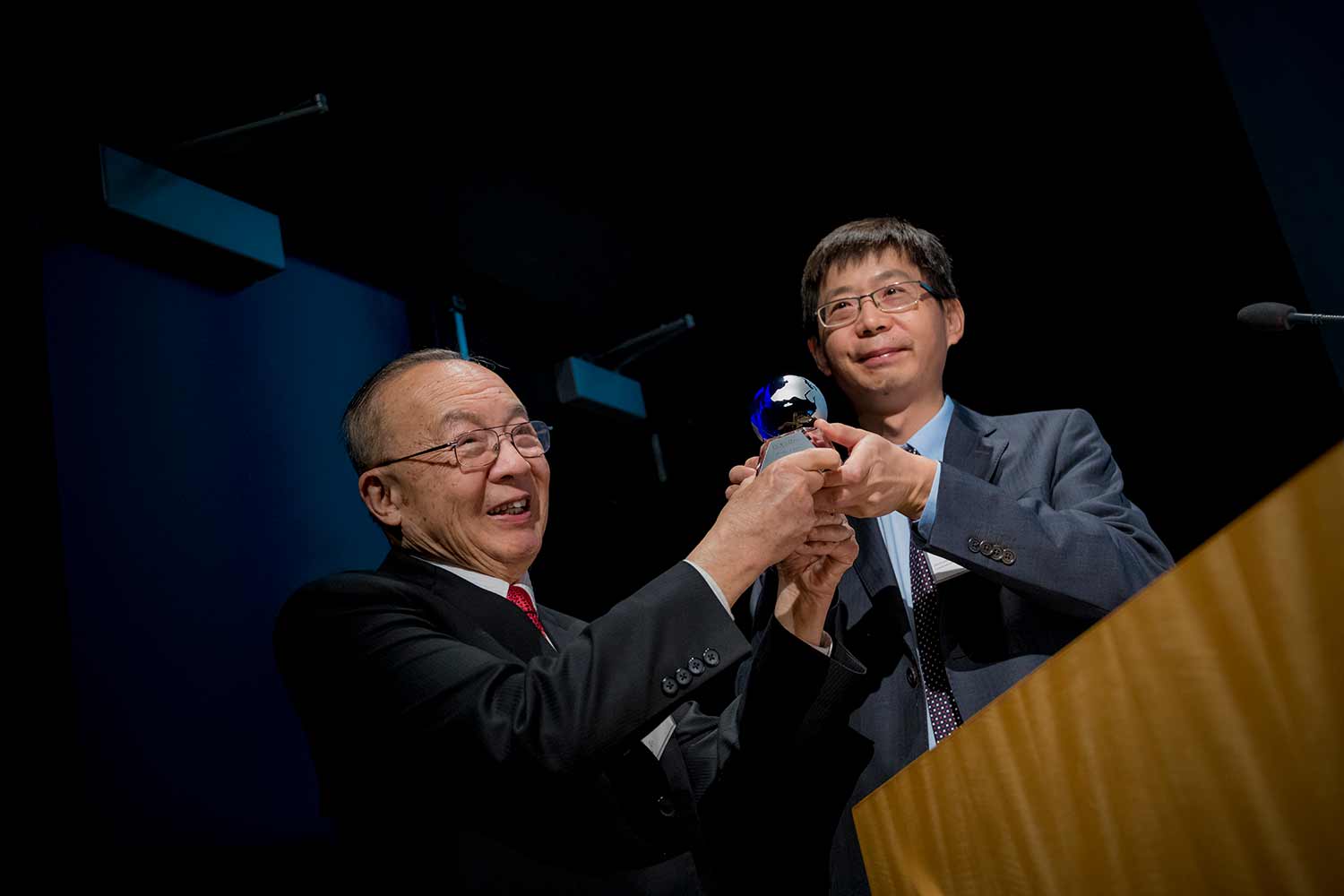
Chien receives a token of appreciation from Kun Zhang, professor and Chair of the Department of Bioengineering, on behalf of the department.
Chien's discoveries underpin our understanding of how blood flows in the cardiovascular system, and are just one aspect of his work that led to the founding of the field of mechanobiology. He won the National Medal of Science for related research, and he has been voted into all three National Academies (Science, Medicine and Engineering). He ran seven—yes seven—different professional scientific organizations, which appears to be a record.
“If you want to know what humble and humility means, you don’t look it up in the dictionary—you look at Shu Chien,” said UC San Diego Chancellor Pradeep K. Khosla. “You look at the way he operates, the way he talks, the way he interacts with people, and the meaning of these two words is very clear. His presence on our campus has been truly transformational. His presence on this planet has been transformational.”
His status as not only a good scientist, but more importantly a good person, was evident during the two-day symposium featuring the remarks and stories of more than a hundred former students and colleagues, many of whom traveled across the world to celebrate Chien’s lifetime accomplishments and wish him well in retirement.
For his part, Chien said he’s grateful for the support he’s received over the course of his long career, and attributed much of his success to the people surrounding him.
“I’m extremely grateful to you all for your strong support over all these years,” Chien said. “UC San Diego is an ideal place to work and I’m very grateful that I’ve been here for over three decades. Every day has been a wonderful day, and I enjoy every moment of every day. There are many reasons for this, but the most important one is the people—I’m most grateful for having such wonderful people to work with, including faculty, students, and staff.”
Chien, the mentor
One of the many qualities that has set Chien apart is his mentorship, whether in a formal capacity or not.
“He’s a brilliant scientist, he’s a visionary administrator and leader, and he’s a gifted mentor, but to me what really stands out as I think about my interactions with him over the past decade-plus is his great personal generosity,” said Sanjay Kumar, Chancellor’s Professor and chair of the Department of Bioengineering at UC Berkeley.
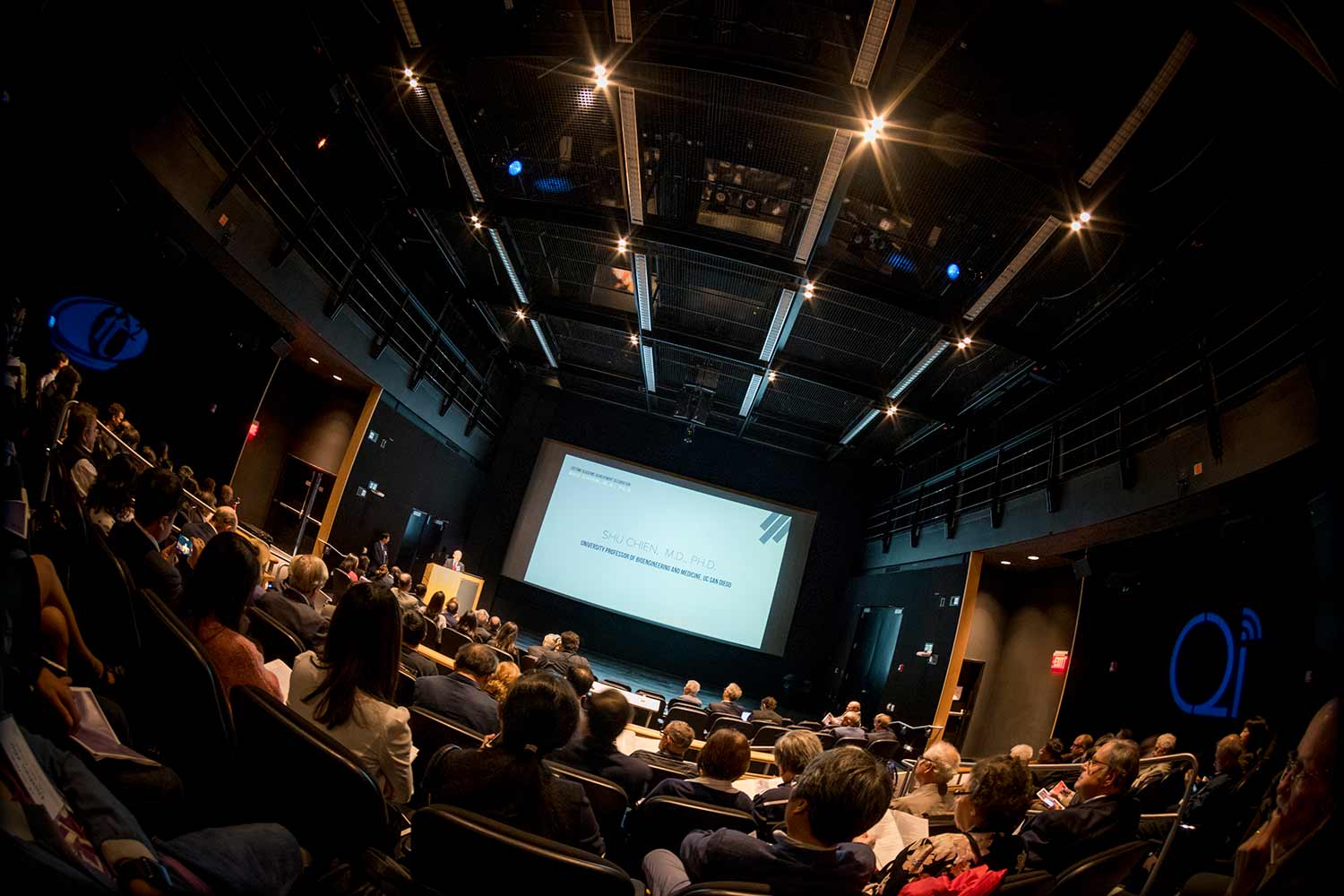
More than 100 people spoke about the effect Chien had on their lives during the two-day event.
Kumar never formally studied under Chien or even collaborated with him directly on projects. Yet, Chien attended one of his talks at a conference early in Kumar’s career, and was an advocate from then on, writing letters of recommendation and serving as a sounding board.
“He goes out of his way, well beyond the point that he has to do this, to encourage you in what you’re doing. I’m truly grateful for him taking the time to do that.”
Tejal Desai, professor and chair of Bioengineering and Therapeutic Sciences at UC San Francisco, shared a similar story from early in her career.
“Despite the fact that he was not only chair of the department at UC San Diego, president of BMES, and a conference organizer, he came up to me after my talk and shook my hand and gave me not only words of encouragement, but actually told me something that I think has shaped my career from then on, which is ‘As you’re developing the engineering of your device, make sure you pay attention to the biology,’” Desai said.
“He didn’t need to do this—I wasn’t a student in his lab, I wasn’t a student even at the institution he was teaching, but that simple act of encouragement really told me that I could actually do this. I could take the next steps and pursue a career in academia.”
Of course, he provided the same level of support and guidance to his own students, always willing to call in help from colleagues when necessary, and make connections for students’ benefit.
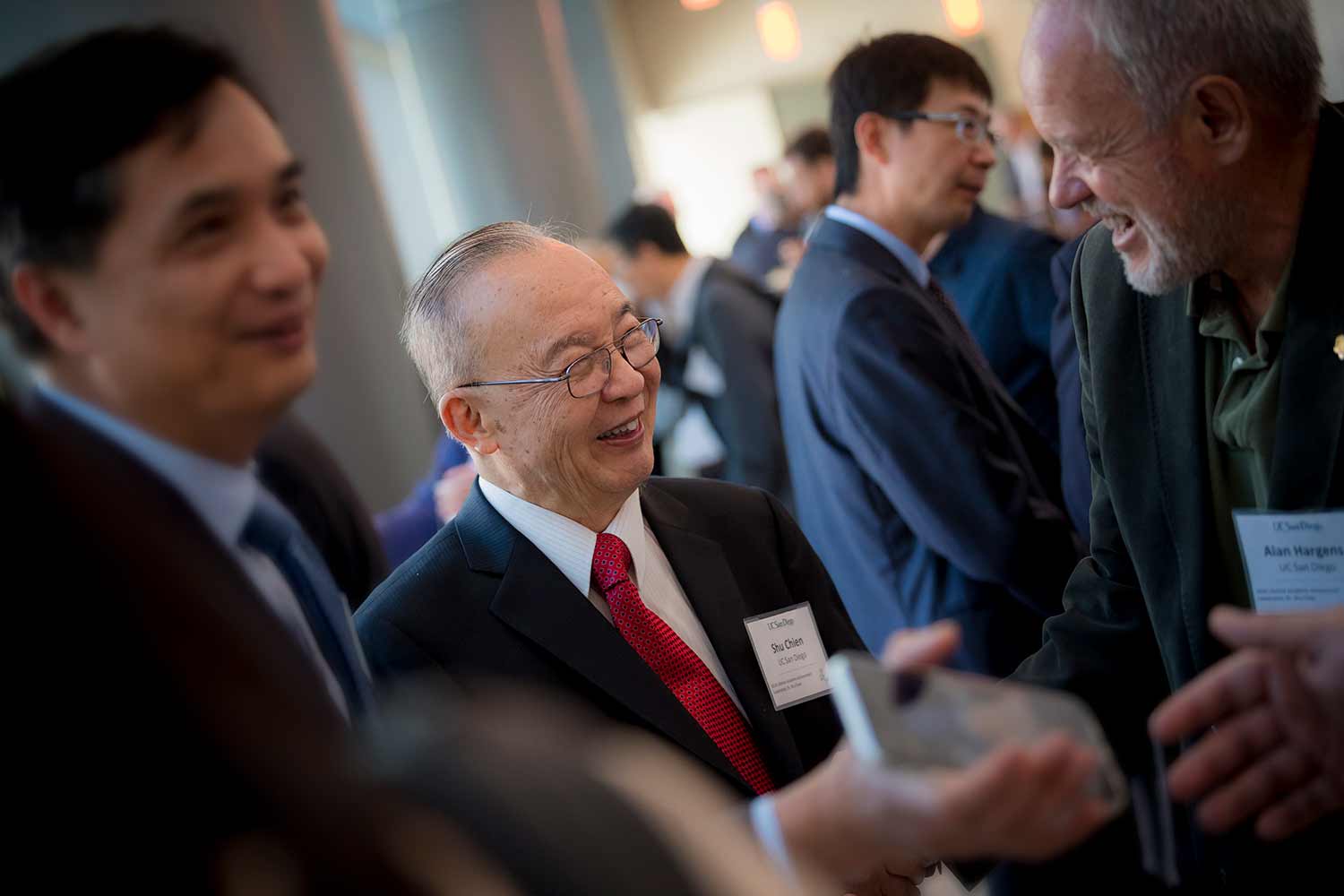
Chien was renowned for his kindness and generosity as much as for his pioneering research.
“The opportunities that I was afforded just by Professor Chien picking up his finger and making those phone calls and connections so that you were able to go and talk to somebody, changed basically my career and my life,” said Cathy Galbraith, associate professor of biomedical engineering at Oregon Health and Science University, and Chien’s first doctoral student at UC San Diego.
Stories of Chien’s willingness to go above and beyond run the gamut. There was the time he literally chased down a thief in a market to return money stolen from the pocket of Cheng Zhu, one of Chien’s trainees at Columbia and now a professor of Biomedical Engineering at Georgia Tech. Or the time he officiated the wedding of a former student and flew to Taipei to do so. He and his wife, KC, hosted countless gatherings for students, faculty, and the department, where Chien served as grillmaster himself. He responds to every email and note he receives, and remembers everyone’s name that he meets, showing the value that he places on those around him.
“Officially, I was not trained under Professor Chien, but he has taken me under his wings for more than 30 years,” said Julie Y.H. Chan, president of the International Union of Physiological Sciences. “As his mentee, Professor Chien was my role model as I was a young physiologist moving up in my career. Then, later on, he guided me with do’s and don’ts in international and national scientific governance.”
“He taught us not only how to do good science, but also how to be a better person,” said Chi-Huey Wong, the Scripps Family Chair Professor of Chemistry at The Scripps Research Institute, and past president of Academia Sinica.
Chien, the Triton
Chien joined the University of California San Diego in 1988 after a 31-year career at Columbia University. He joined a nascent group of faculty working on biomedical research, and was a galvanizing force in the creation of the university’s Department of Bioengineering, which has consistently been top-ranked globally. In 1994, Chien became the founding chair of the department, and was the principal investigator on the Whitaker Foundation grant that led to the establishment of Powell-Focht Bioengineering Hall, the first privately funded academic building on UC San Diego’s campus.
In 2008, Chien spearheaded the development of the Institute for Engineering in Medicine, a unique, multidisciplinary collaboration of more than 200 faculty from UC San Diego’s Schools of Medicine, Pharmacy and Engineering, working to bring technical solutions to healthcare challenges. The institute spurred advances such as using fluorescent imaging to more accurately remove cancerous cells; using tissue engineering to repair spinal cord damage; and creating wearable technology to monitor blood pressure. Bridging engineering and medicine might seem commonsense now, but at the time it was a revolutionary idea.
He was also the founding director of the UC system-wide Bioengineering Institute in California, where he contributed to collaborations in research among the 10 UC campuses, many of which he also helped launch. In a story heard time and again, Shu was an advisor and mentor to Scott Simon, the current chair of the Bioengineering Institute of California—his fingerprints are everywhere.
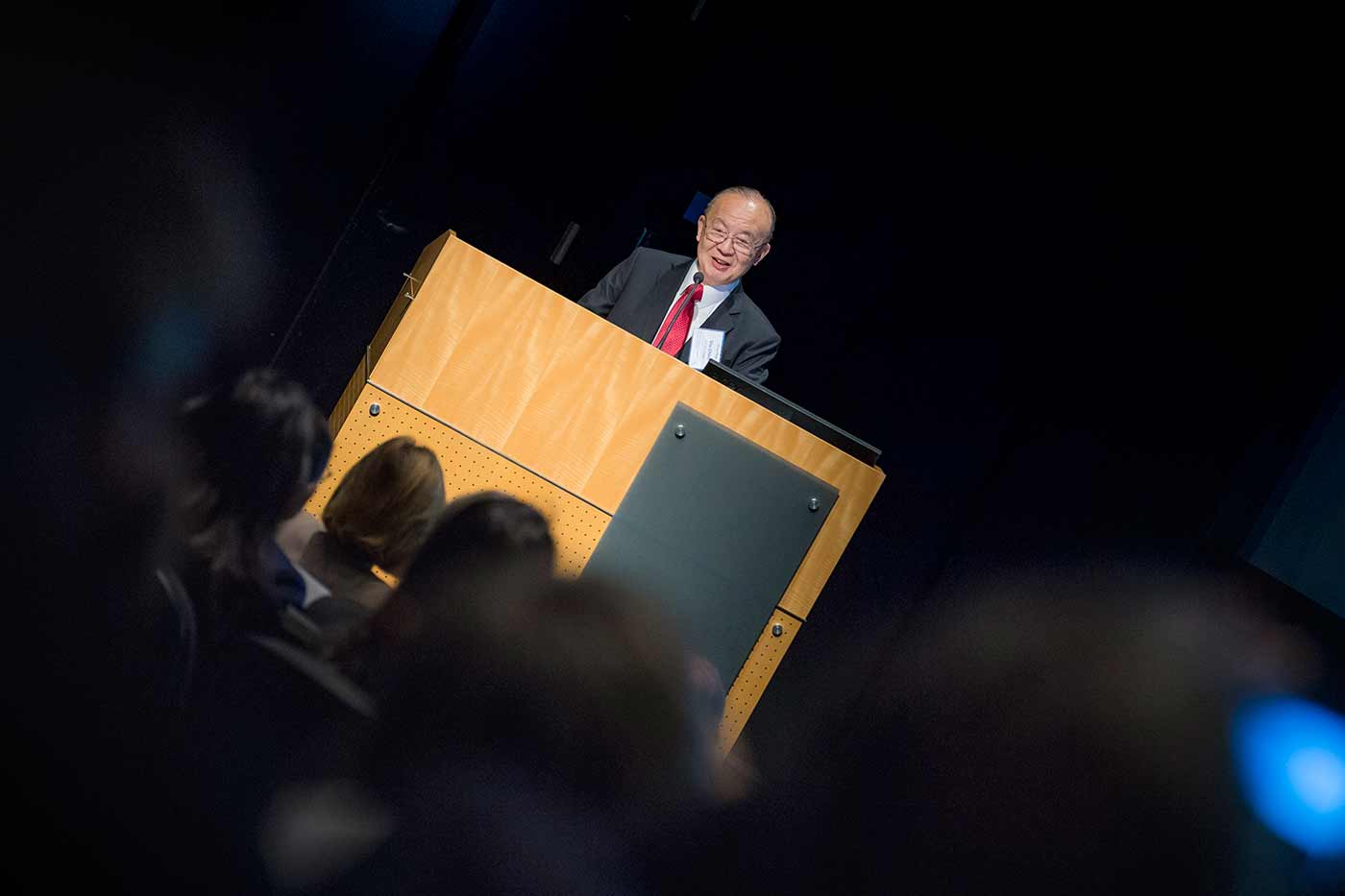
"Every day has been a wonderful day, and I enjoy every moment of every day. There are many reasons for this, but the most important one is the people—I’m most grateful for having such wonderful people to work with, including faculty, students, and staff," Chien said.
Not only did Chien transform the UC San Diego campus and UC system, but he also impacted the San Diego region as a whole, which has become a biotech and life science industry hub.
“Industry goes to where the excellence is,” said Anthony Ratcliffe, CEO of Synthasome, Inc. “San Diego is one of the centers of excellence of biology in medicine, developing product. And you now know that— you look around and see all these companies here doing R&D, and the reason is because the excellence that they need to have it done is here, in no small part due to the effort of people like Shu Chien.”
Chien, the research pioneer
Chien was born and raised in China, and earned his medical degree from National Taiwan University before moving to Columbia to earn his Ph.D. in physiology. His early work focused on blood rheology, figuring out the forces that affect blood flow in the heart and blood vessels.
His pace-setting research on the flow properties of blood formed the foundation of the use of blood thinner in preventing heart disease, and he invented a more efficient method to screen for adverse effects of small molecule drugs in patients.
Chien’s foundational work on microcirculation, endothelial cell transport and arterial disease are fundamental to our understanding of cardiovascular disease, and his research into the effect of mechanical forces on gene expression and signal transduction have far-reaching effects on stem cell research and our understanding of cancer cells.
His coupling of biology and engineering at the cellular, molecular and genetic levels was pioneering, and he was an early founder of the field of cellular and molecular bioengineering. In fact, during his tenure as president of the Biomedical Engineering Society, Chien helped the Society launch its second journal, the Journal of Cellular and Molecular Bioengineering.
Chien was awarded the National Medal of Science in 2011 for this work, and is one of only 12 people to be inducted into all three national academies: National Academy of Engineering, National Academy of Medicine, and National Academy of Sciences. He was also inducted into the American Academy of Arts and Sciences. He’s received the Franklin Medal, the Revelle Medal, and is the only two-time recipient of the Melville Medal for best original paper from the American Society of Mechanical Engineers.
Chien, the leader
The Biomedical Engineering Society isn’t the only one Chien helmed during his 62-year career. In what is believed to be a record, he served as president of seven different professional organizations, shaping the trajectories of the fields of physiology, biomedical engineering, and experimental biology as a whole, and perfecting a leadership style that was at once gentle yet effective.
“I’ve observed a phenomenon I call the Shu phenomenon—that is when Shu asks us to do something, we never question him. Instead, we just follow his plan,” said Shaochen Chen, chair of the UC San Diego Department of NanoEngineering and founding co-director of the Biomaterials and Tissue Engineering Center in the Institute for Engineering in Medicine.
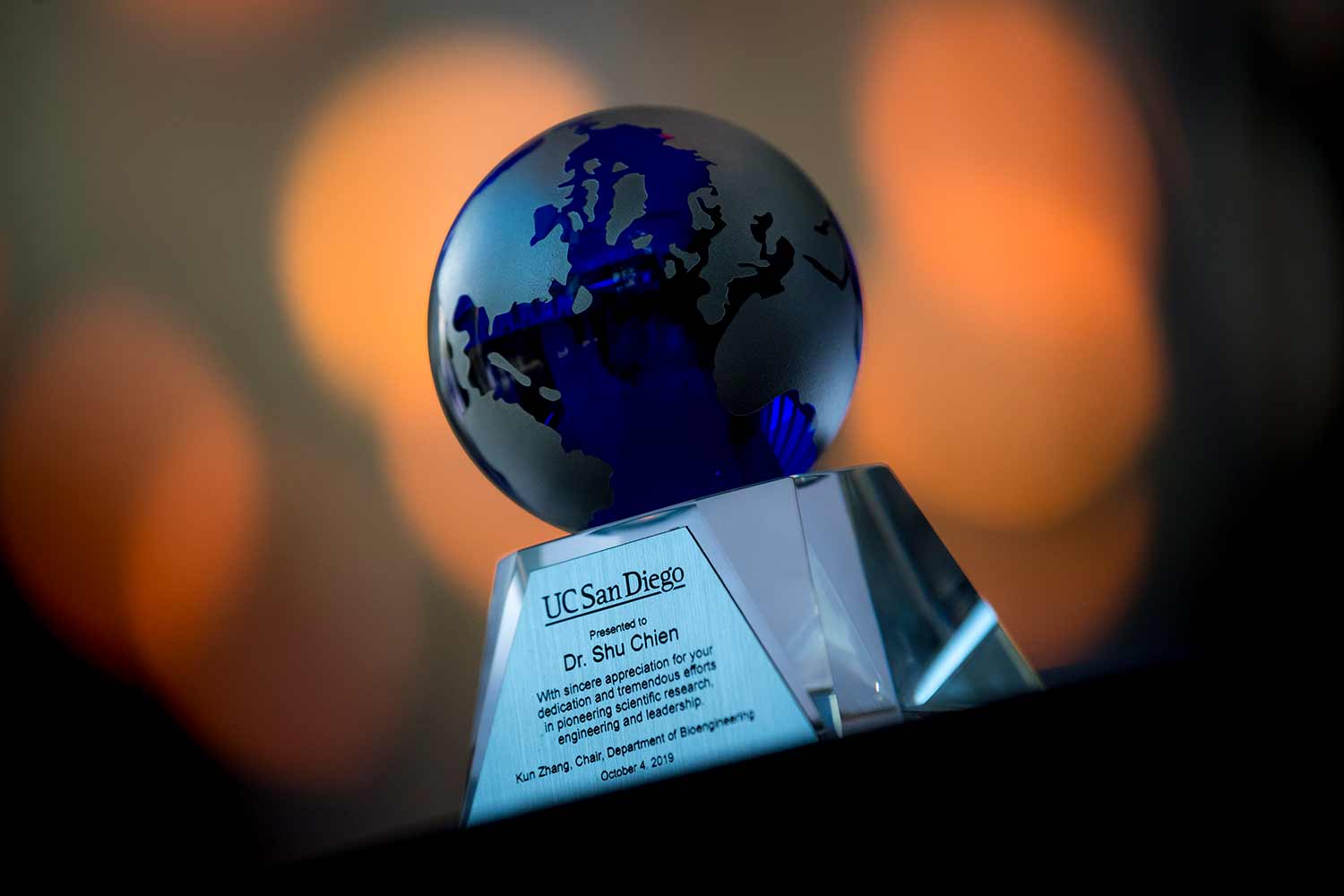
A token of appreciation from the UC San Diego Department of Bioengineering in gratitude for the immeasurable impact Chien had on the trajectory of bioengineering at UC San Diego.
Of course, Chien’s plans are always thoroughly researched, thoughtfully planned, and with everyone’s best interest in mind.
“He cares so much about the people around him, which is one reason that Shu is always able to build trust,” Chen said. “And we trust him dearly.”
Chien has served as president of the Biomedical Engineering Society; Microcirculatory Society; American Institute for Medical and Biological Engineering; American Physiological Society; Internal Society of Biorheology; American Chinese Medical Society and Chinese American Academic and Professional Association, as well as chair or co-chair of 1st World Congress of Biomechanics, 35th International Congress of Physiological Sciences, 12th International Congress of Biorheology, and 1997 Annual Meeting of Biomedical Engineering Society; and he helped establish Taiwan’s Institute of Biomedical Sciences in Academia Sinica.
“As a leader of our scientific community, he would always act like a benevolent general, who’d be standing on the hill, looking at the whole battlefield to see where everything was in our field, while at the same time being down there in the battlefield waging the war, and not dropping the ball anywhere,” said Kyriacos Athanasiou, Henry Samueli Chair in Engineering for Biomedical Engineering at UC Irvine.
Many students and even colleagues shared their regard for Chien as a father figure in their lives, both academically and personally.
“At the National Medal of Science event, I was struck by the way in which your granddaughters adoringly refer to you—with such adoration they would say, ‘Papa,’” said Roderic Pettigrew, immediate past president of the National Institute of Biomedical Imaging and Bioengineering and executive dean for Engineering Medicine at Texas A&M University. “And I thought that was so befitting, because indeed to all of us, you have been our papa. Shu Chien, the world is a better place because of you.”
Share This:
You May Also Like
Stay in the Know
Keep up with all the latest from UC San Diego. Subscribe to the newsletter today.


